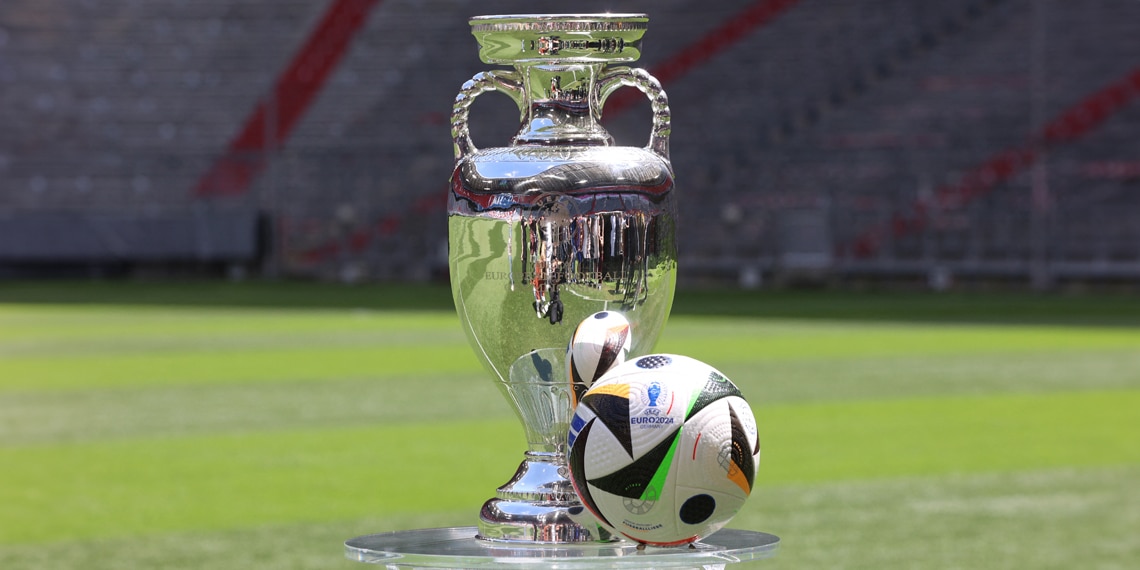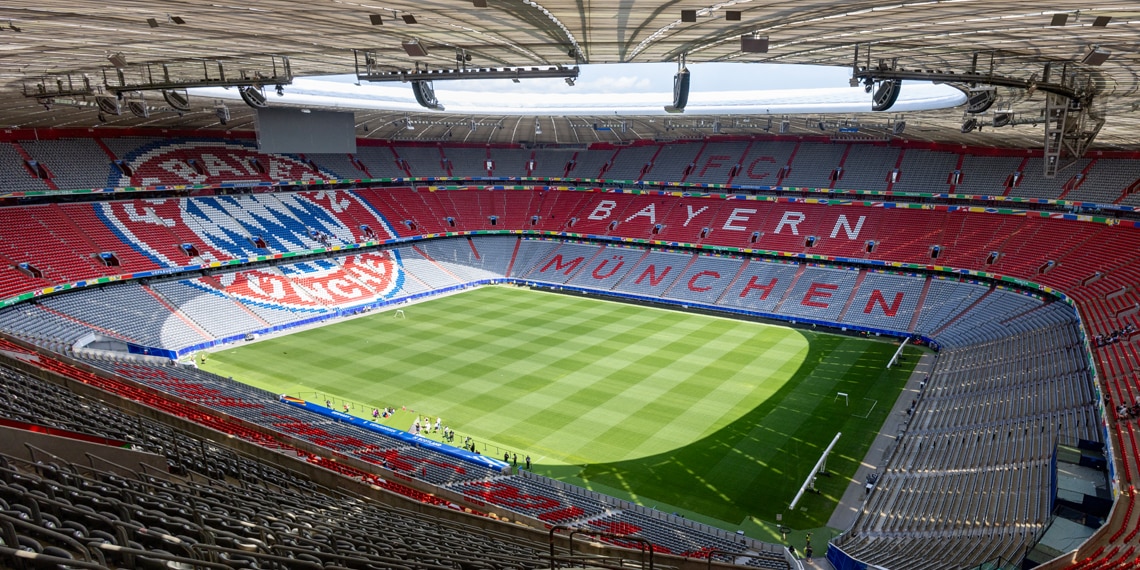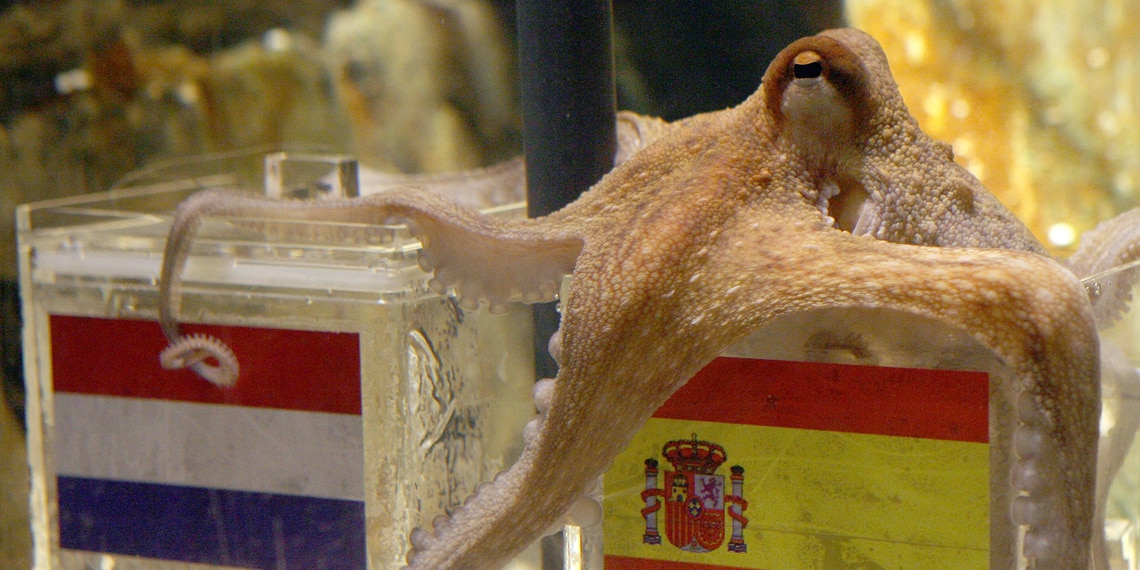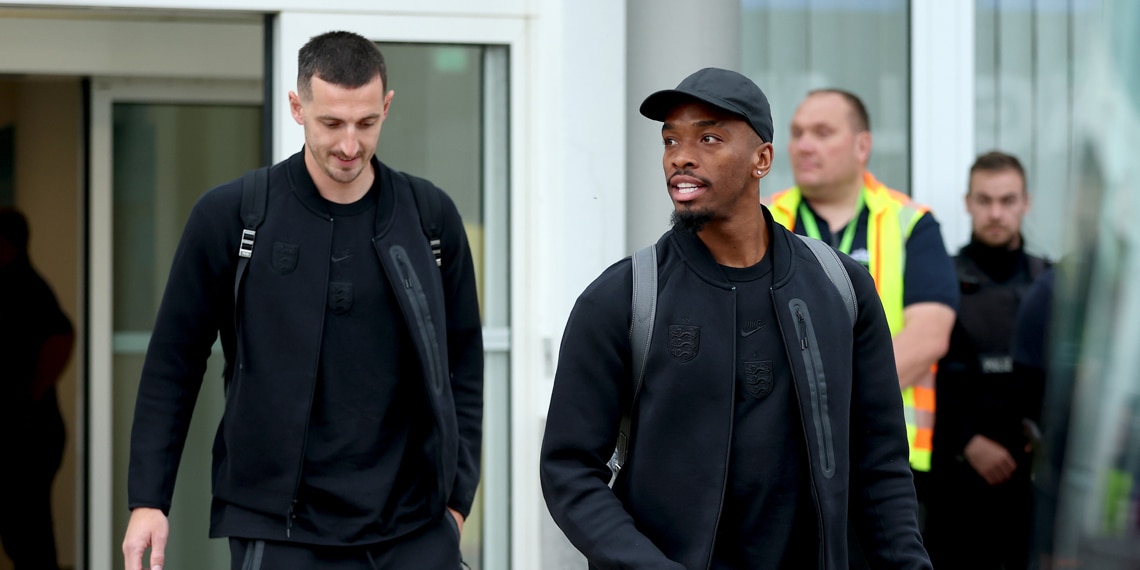
Welcome to This Week from Premier Skills English, a weekly review of football action for learners of English from across the globe. In This Week, Jack talks about stories from this week in the Premier League and there are lots of football English words and phrases for you to learn.
The UEFA European Football Championship 2024 kicks off on Friday

The trophy for the UEFA Euro 2024 European Football Championship in display inside the Allianz Arena
On the 14th of June next Friday at 8 o'clock Scotland and Germany kick off the UEFA European Football Championship which is more commonly known as Euro 2024. 24 national sides will travel to Germany to compete in the second largest international football competition, after the World Cup.
The first European Football Championship was held in France in 1960 and the championship has been held every four years, in between the World Cups, ever since. The first competition was won by the Soviet Union. Since then, the most successful teams have been the Spanish and German sides. The Spanish team first won in 1964 and then had back to back wins in 2008 and 2012. The German side first won in 1972 and 1980, though back then they were West Germany. They won again in 1996. France has won the competition twice, as has Italy who are the current champions. England has never won the European Football Championship, though did make the final last time.
In the early years of the tournament, only 4 teams took part. There were lots of qualification matches, in 1964, 29 teams took part in the qualification rounds, but only four teams played in the finals matches. In 1980, this increased to 8 and then in 1996, 16 teams competed; this number increased again in 2016 and now, 24 teams take place, playing 51 matches. In Germany, the teams are divided into 6 groups of 4. The winners and second place of each group and the four best third places will progress to the knockout stages, starting with a round of 16, and then the quarter finals, semifinals and ultimately the final to decide the winner.
The Euros have been hosted across Europe; starting in France, and then four years later, the tournament was held in Spain, then Italy, Belgium, then Yugoslavia and so on. In 2000, the hosting duties were shared by Belgium and the Netherlands and have been shared by Austria and Switzerland and Poland and Ukraine. The 2020 UEFA European Football Championship celebrated the tournament’s 60th year and to mark the occasion, the competition was held in 11 countries across Europe. This summer, all the action will happen in Germany and matches will be played in 10 cities around the country.
The vocabulary from this part of the story that I’m going to talk about is:
- Back-to-back wins
- To make the final
- Knockout stages
- Hosting duties
Back-to-back wins
The phrase back to back means consecutive, or in a row, without a break. I think you can use the phrase for more than two events in a row, but it’s most commonly used to talk about two events. In the story, I said that the Spanish team had back-to-back wins. They won in 2008 and then again at the next tournament in 2012. There was no other winner between their wins so they won back to back tournaments. I looked up the phrase to see if the origins were interesting, but there’s no clear etymology. The only other use of the phrase that I know of is the phrase back to back houses. These are houses, normally small houses for poor people, that are built so that they share a back wall, so there is no gap between the houses. Back-to-back houses are quite famous in some cities, and there is even a kind of museum with a restored street of back-to-back houses in Birmingham. So, this might be where the phrase comes from,
To make the final
The verb make has lots of uses. In this case, to make it somewhere means to arrive somewhere or at something successfully. You can also say make it to somewhere.
So you might hear someone say: do you think they will make the final? Meaning, do you think the team will progress all the way to the final. England has only made it to the final once. I thinbk we usually use the phrase “make it to” when we’re travelling. What time will you make it to the office tomorrow? If the traffic isn’t too bad, I should make it there by five.
Knockout stages
The knockout stages of a football competition are when if a team loses, they are out of the competition. So in the Euros, there is the group stage, where each team plays three matches and then if they progress through to the knockout stages, they start in the round of 16. In this round, there are 8 matches. The winners make it through to the quarter finals and the losers are knocked out, they are out of the competition completely.
Hosting duties
Normally, if a team is playing in their home stadium, they are the hosts. The noun host describes the person that provides the location and whatever else is required for an event. On the smallest scale, you might be a host if you invite a friend to stay at your house. In football English, the home side are the hosts and the visiting side are guests. In an international tournament, it’s a bit more complicated because whole country is the host country and the host country will need to organise matches and transport and all the other facilities that are required for a major tournament. I described these as the hosting duties. The noun duty describes something that you have to do, that you have an obligation to do. Sometimes, you have a legal duty to do something, if you don’t do it, it’s against the law. Sometimes you have a contractual duty, so you have signed a contract and might get sued if you don’t do it. Most commonly, I think, duties are moral and it would be considered wrong if you don’t do your duty.
Welcome to Germany

The Allianz stadium in Munich ahead of the football UEFA Euro 2024
The opening match will see the hosts take on Scotland. The Tartan Army have been made to feel welcome in Bavaria. There’s a lovely video online of Aston Villa’s John McGinn joining in some athletic folk dancing. For added drama, when Germany and Scotland face off in the opening match at the Allianz Arena in Munich, the Brighton and Hove Albion midfielder Pascal Groß will be taking on his teammate Billy Gilmore.
A question I have been asked a few times by students in my English classes is why there isn’t a UK national team. The main reason for this is the long history of the national teams in the UK and that the four nations that make up the UK have distinct national identities. The first international football tournament was the British Home Championship that was started in 1883 and contested by the United Kingdom’s four national teams, at the time, England, Scotland, Wales and Ireland. By 1960, when the first European football championship was held, the UK national teams were well established and wanted to play in their national colours. In the Olympics, the UK is represented by team GB and there used to be a GB football team, but since the 1970s, the UK has only sent one men’s team and that was in 2012 when the games were held in London.
Athletic
The adjective athletic refers to athletes. The word athlete derives from a Greek word that means someone who competes in a competition, but today, it’s used to describe someone who competes in a physical competition and is physically fit and strong. You might describe a person as athletic, if they have a good physique and are slim and have visible muscles. Footballers are athletes. All professional sports people are athletes. In the story, I said that John McGinn joined in some athletic folk dancing. I was being a bit silly, because normally, you wouldn’t describe folk dancing as athletic, but some of the moves that the other dancers were performing were quite athletic, in that they demonstrated physical strength and training.
Drama
The noun drama usually refers to a type of TV programme or film that is about the real problems that people face. However, the noun can also be used to talk about the excitement and worries and strong emotions that are felt about and during an event or situation. Often, when people get together, perhaps for a party, or a holiday celebration like Christmas, they start arguing and fighting. If this happens, these people are causing drama. Some people seem to generate a lot of drama wherever they go. At the opening match in Germany, Pascal Groß will be taking on his teammate Billy Gilmore. I don’t know how well Billy and Pascal get on, but they are both midfielders and I like to think that Billy looks up to the more experienced Pascal. So when they are on opposite sides, there will be a bit more feeling about the encounter; there will be added drama.
Distinct
If something is distinct, it is clearly different and not part of the things around it. This adjective is related to the verb to distinguish which means to be able to notice the difference between two or more things. The things that a person can distinguish, that they can tell the difference between are distinct. We also use the adjective distinctive which means that something is different from everything else. So when I was at school I had a friend who had a really distinctive laugh. Even when the whole school got together for assembly, you would always know where he was because nobody laughed like him.
In the story, I said that the four nations that make up the UK have distinct national identities. People in England feel English and identify as English and people in Scotland identify as Scottish and the same is true for Wales and Northern Ireland.
National colours
A team’s national colours refers to the colours that are part of the country’s national symbols. For some countries, the national colours are a strong part of their national symbols. I live in Scotland now and the Scottish flag which is called the Saltire is white and blue. You can see these colours all over the place especially in the summer when there are international sporting events. There is actually a wikipedia page that lists the national colours of lots of different countries. Interestingly, they don’t include the nations that make up the UK and only have colours for Great Britain.
When someone is said to be wearing their national colours, it normally refers to the uniform they wear when they are representing their country. It means they are playing for their national team, they are wearing the team uniform of their national team.
Fan favourites at the tournament

An octopus named Paul opens a box with decorated with a Spanish flag and a shell inside
One of my favourite Euro stories was of Paul the Psychic Octopus. Paul was a common octopus who lived in Oberhausen in Germany. Paul demonstrated high levels of intelligence and so the staff at the aquarium where he lived tried various ways of testing him. During the Euro 2008 tournament, Paul was presented with food in containers with flags representing the teams that Germany was set to play against and predicted the winner of the matches by selecting the food from the container with the right flag. Paul correctly predicted 4 out of 6 of the outcomes for the German side in 2008 and did even better for the following World Cup. Unfortunately, octopuses don’t live very long so German fans will have to look elsewhere this time for clues about their team’s chances of victory.
When these big international tournaments happen, large groups of fans often drink too much and behave badly at and around the matches. Tales of hooligans have embarrassed the English national side for years. However, in 2012, when the tournament was held in Poland and Ukraine, the Irish fans earned a reputation for being the best fans for their good humour and friendly behaviour. On one occasion, a group of fans fixed a dent in a car and on another, when fans were on a train with a nun, they burst into song and serenaded the nun with a heartfelt rendition of Our Father.
In 2016, fans from Iceland enjoyed special attention because of their signature Viking Thunderclap which was a particularly impressive way of supporting their team. The fans started with a synchronised slow clap and low yells that gradually gets faster and louder until erupting into cheers and applause. Sadly, Iceland have not qualified for this year’s tournament, but there are other Viking nations that may adopt the thunderclap.
Psychic
The adjective psychic describes someone who has a special ability that enables them to know things that are beyond the range of normal experience. So a psychic might be able to know what another person is thinking or in the case of Paul the Octopus, might know what is going to happen in the future, before it has happened. Personally, I am very sceptical about anyone claiming to have psychic powers that has not already won the lottery or been banned from every casino in Las Vegas.
Hooligan
The noun hooligan describes a violent person that attacks people physically and starts fights or vandalises things and causes damage in public places. There are several different explanations for the origin of this noun. The one I like best is that there was a man called Patrick Hooligan who worked as a very badly behaved security guard. In 1899, a writer called Clarence Rook wrote about Patrick Hooligan’s life claiming that it was that one man who gave the word its meaning. For a long time, the word just meant a young rowdy person who would get up to trouble, breaking things and starting fights, but in the 1970s, the word began to be associated with violence in sports. Football clubs used to have unofficial supporters clubs that would follow their team just to start fights with rival fans. This was reported as football hooliganism and was a real problem for football in the UK. There are still problems between groups of supporters, but the clubs have worked really hard to make match day a fun and safe experience for everyone and have a zero tolerance policy for any violent or threatening behaviour.
To serenade
The verb to serenade means to sing or play an instrument to someone, usually as a romantic gesture. I'm not sure if it would still be considered acceptable, but in the past, people would visit the person they were in love with and stand under their window at night to sing or play music for them. These days, we use the verb in a slightly silly way to say that someone sang to someone else. So in the story, I spoke about the Irish fans that sang Our Father to a nun on a train. This wasn't a romantic gesture, but you can still use the verb to serenade to describe this sort of dramatic act. When I was first teaching English, I used to take my guitar into class all the time and I would serenade my students with pop songs they liked to help them learn English. I’m not sure it was a very effective teaching technique.
Synchronised
The adjective synchronised means at the same time. There's a sport called synchronised swimming that involves a team of dancing swimmers who perform moves that are tightly choreographed so that all of the swimmers do things at exactly the same time. We also use the phrase in sync to say that a team is working well together. If people are in sync with each other, they don’t necessarily do things at the same time, but they work efficiently so that when one person finishes their role, the person that takes over from them is ready to go, there's no waiting around.
The big question

Lewis Dunk and Ivan Toney of England look on upon arrival ahead of the UEFA EURO 2024 Germany at Erfurt airport
The big question is: who is going to win? Until recently, the English team were the bookmakers’ favourites to win the championship in Germany, but then they lost against Iceland and I’m not sure if they are still the leading contenders. The English squad does have the most valuable players, with a combined value of £1.2 billion pounds. Close behind England, both in terms of the bookmakers odds and the combined value is the French side. France has had more international success than England so that might give them the edge. In third place in terms of value is Portugal and they have the added advantage of Cristiano Ronaldo, the all-time leading goal scorer in European Championship history, who is playing in his sixth tournament. And then there’s Germany who have the home advantage and the opportunity to secure a 4th title and become the most successful UEFA European Football Championship team.
Whatever the score next Friday, the following four weeks of matches will be a summer sporting treat that will see us through till the middle of July and then there will just be a few short weeks till the start of the new Premier League season.
Bookmakers’ favourite
This is something that has come up a few times. A bookmaker is a person who runs a betting business. They offer odds on events happening. This means, they offer deals that say if you give them £10, they will give you back £30, for example if something happens. So I’ve just looked at a bookmakers website to see what the odds are for different teams to win Euro 2024. They are offering odds of 5/1 for Germany to win, which means if you bet £10, they would pay you back £60, that’s five times your original bet plus your stake, or the money you originally paid. The longest odds are for Georgia, Albania and Slovakia. They are offering 500/1. The shortest odds are 7/2 and that’s for England to win so the bookmaker thinks that England are going to win. The phrase bookmakers’ favourite means the result, the team or horse or whatever else you might place a bet on that the bookmaker thinks is going to win and so offers the shortest odds on.
Contender
A contender is someone who is competing in a competition. We talk about strong contenders when we want to talk about competitors that we think have a good chance of winning. If you don’t think that someone has a chance of winning, you could say that you don’t think they are a serious contender. There is a famous scene from an old film called On the Waterfront about a boxer who threw away his chance of becoming a champion because his brother wanted to make money betting against him. When the boxer looks back at his career and realises that he wasted his chance, he tells his brother: You don't understand. I coulda had class. I coulda been a contender.
Language challenge
Now it’s time for you to think about this language again. I have used AI to come up with examples of today’s words and phrases. I have removed the vocabulary from the stories so I want you to fill in the gaps with the correct forms of the language from the podcast.
Question 1: He visited a ________ to get insights into his future and love life.
Question 2: Her _________ performance in the last game was nothing short of spectacular.
Question 3: Despite being twins, they have very _________ personalities.
Question 4: The hikers set off at a fast pace to _______ the campsite before dark.
Question 5: The young man hired a violinist to __________ his bride on their wedding day.
Question 6: Despite the tough competition, she remains a leading ____________ in the election.
Leave your answers to this language challenge in the comments section at the bottom of the page
Football phrase
Now it’s time for this week's football phrase.
The regular football phrase this time is ******. The clue this time is: the winning team at the Euro 2024 championship will be inscribed on the back of the Henri Delaunay *****.
The fiendish football phrase comes from a profile of the Scottish midfielder Billy Gilmour. In the profile, Gilmour is described as having been a ***** ******* at Rangers. This phrase is used to describe someone who demonstrates an incredible talent for something at a very young age. It’s not really football English, but quite often, footballers are described in this way as they all start so young.
If you know the answer, be sure to leave it in a comment at the bottom of this page.






Log in or register to post comments